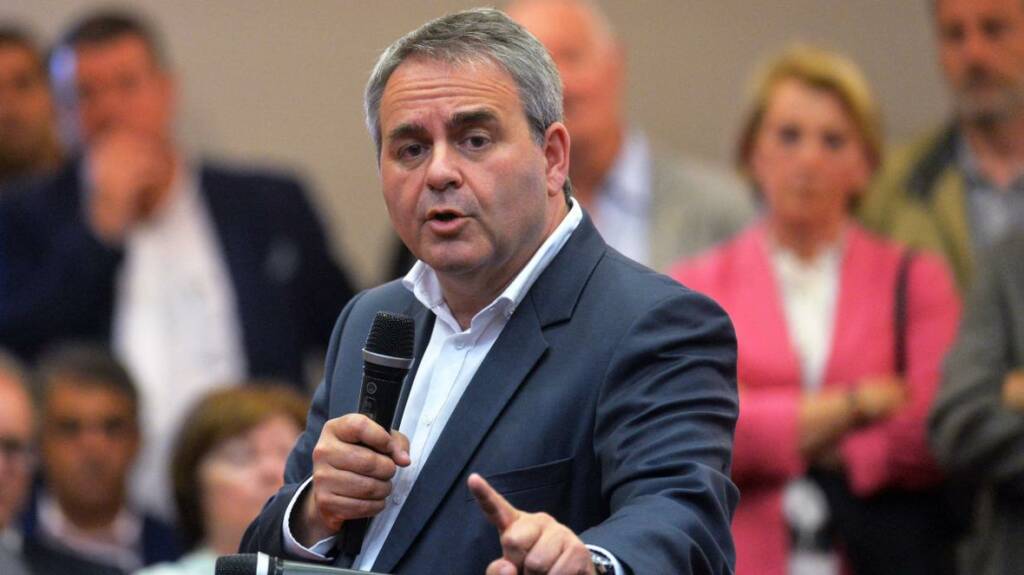The French political landscape has become a little more complicated with the entry of another political leader with the capability to become the next president of France. In the northern region of Hauts-de-France, Xavier Bertrand, a politician from the center-right Les Republicains party, won the regional vote on Sunday with roughly 52 percent of the vote. According to exit polls issued by France’s interior ministry, he defeated a far-right contender Marine Le Pen’s National Rally who received roughly 26% of the vote These results can be a signal to the possibility of Xavier Bertrand becoming the next President of France as the presidential polls next year will observe the coalition skills of the politicians running for the post.
Bertrand, a two-time minister who claims he was mocked because he was a “provincial oaf” who had never attended an elite school, won the first round of a regional election in northern France on Sunday, defeating rivals from Marine Le Pen’s National Rally and President Emmanuel Macron’s La République en Marche (LREM). Bertrand’s landslide victory over the National Rally challenger dealt a blow to Le Pen’s allies, indicating that they could be defeated by a conservative in a hardscrabble region that has become a bastion for the far-right. It also compelled the rest of France’s political class to pay attention to Bertrand, whose presidential bid, declared in March, had received little attention up to this point.
Bertrand also claimed on Sunday that the outcome gave him the strength to answer the needs of all French people, implying that he hopes to run for president in next year’s elections. Les Republicains have yet to decide who would lead their presidential campaign, but Bertrand has a good chance of winning after Sunday’s vote.
Plus que jamais je crois qu’il n’y a pas de fatalité, que la politique n’est pas morte, qu’elle peut rendre la vie meilleure. Ce résultat me donne la force d’aller à la rencontre de tous les Français. pic.twitter.com/JuXFlqd2Oy
— Xavier Bertrand (@xavierbertrand) June 27, 2021
“He is currently the best placed among potential right-wing candidates in the first round of the presidential election,” Eric Mengus, associate professor at H.E.C. Paris Business School, reported in CNBC. “Yet, the nomination (within Les Republicains) is still open and will take place only in the fall,” Mengus added. “This regional election is definitely bad news both for Ms Le Pen and for President Macron and it may create a positive dynamic for right-wing candidates,” Mengus also said.
Between 2007 through 2012, Bertrand served as labour minister and then as health minister under Nicolas Sarkozy’s presidency. He started his career in insurance and utilises his regional roots to demonstrate that he is not a part of society’s upper crust. Bertrand stated on Sunday that aiding the middle class was his top concern. If Bertrand is chosen by his party, he has until April 2022 to garner enough support to compete in the presidential election’s second round.
The Les Republicians party is debating whether to organise primaries or let party grandees choose a candidate with barely ten months till the election. Valérie Pécresse, who is standing for the presidency of the Greater Paris area, and senator Bruno Retailleau are among her opponents. “Floc floc” has a long way to go before he can challenge the race’s two front-runners. For starters, the regional election’s second round will be held this weekend.
The rise of Bertrand can be observed as a complimentary development to Le Pen losing her traditional base. Since her defeat to Macron in 2017, Le Pen has been seeking to bring the party more into the mainstream, dumping unpopular policies and toning down her attacks on Islam and immigration in order to woo traditional conservative voters. And as one could have realised that, this subtle shift towards political correctness would put off the historic base of the party.
Bertrand first has to convince his camp, the center-right Les Républicains (LR), that he is the right man for the job. Many do not like him, in particular his former boss Nicolas Sarkozy, who still holds a lot of influence over the conservative camp. Bertrand insists he is running as a candidate whatever happens in an attempt to squash any competing bids within the conservative party.
